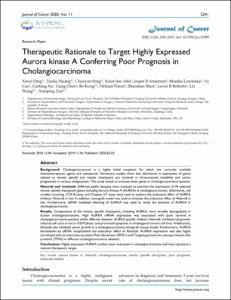Therapeutic Rationale to Target Highly Expressed Aurora kinase A Conferring Poor Prognosis in Cholangiocarcinoma
- Affiliated Author(s)
- 안근수
- Alternative Author(s)
- Ahn, Keun Soo
- Journal Title
- Journal of Cancer
- ISSN
- 1837-9664
- Issued Date
- 2020
- Keyword
- Alisertib; Aurora kinase A; Cholangiocarcinoma; mitotic spindle checkpoint; molecular marker; poor prognosis
- Abstract
- Background:
Cholangiocarcinoma is a highly lethal neoplasm for which the currently available chemotherapeutic agents are suboptimal. Numerous studies show that alterations in expression of genes related to mitotic spindle and mitotic checkpoint are involved in chromosomal instability and tumor progression in various malignancies. This study aimed to evaluate these genes in cholangiocarcinoma patients.
Material and methods:
Different public datasets were analyzed to examine the expression of 76 selected mitotic spindle checkpoint genes including Aurora Kinase A (AURKA) in cholangiocarcinoma. Afterwards, cell number counting, CCK-8 assay, and Caspase 3/7 assay were used to explore the antitumor effect of AURKA inhibitor Alisertib in vitro. In addition, xenograft model was used to evaluate the antitumor effect of Alisertib in vivo. Furthermore, siRNA mediated silencing of AURKA was used to verify the function of AURKA in cholangiocarcinoma.
Results:
Components of the mitotic spindle checkpoint, including AURKA, were broadly dysregulated in human cholangiocarcinoma. High AURKA mRNA expression was associated with poor survival in cholangiocarcinoma patients within different datasets. AURKA specific inhibitor Alisertib, inhibited cell growth, induced cell cycle arrest in G2/M phase, and promoted apoptosis in cholangiocarcinoma cell lines. Additionally, Alisertib also inhibited tumor growth in a cholangiocarcinoma xenograft mouse model. Furthermore, AURKA knockdown by siRNA recapitulated the antitumor effect of Alisertib. AURKA expression was also highly correlated with its interaction proteins Polo-like kinase 1(PLK1) and Targeting protein for xenopus kinesin-like protein2 (TPX2) in different cholangiocarcinoma datasets.
Conclusions:
Highly expressed AURKA confers poor outcomes in cholangiocarcinoma and may represent a rational therapeutic target.
- Department
- Dept. of Surgery (외과학)
- Publisher
- School of Medicine (의과대학)
- Citation
- Xiwei Ding et al. (2020). Therapeutic Rationale to Target Highly Expressed Aurora kinase A Conferring Poor Prognosis in Cholangiocarcinoma. Journal of Cancer, 11(8), 2241–2251. doi: 10.7150/jca.31989
- Type
- Article
- ISSN
- 1837-9664
- Appears in Collections:
- 1. School of Medicine (의과대학) > Dept. of Surgery (외과학)
- 파일 목록
-
-
Download
 oak-2020-0375.pdf
기타 데이터 / 1.72 MB / Adobe PDF
oak-2020-0375.pdf
기타 데이터 / 1.72 MB / Adobe PDF
-
Items in Repository are protected by copyright, with all rights reserved, unless otherwise indicated.